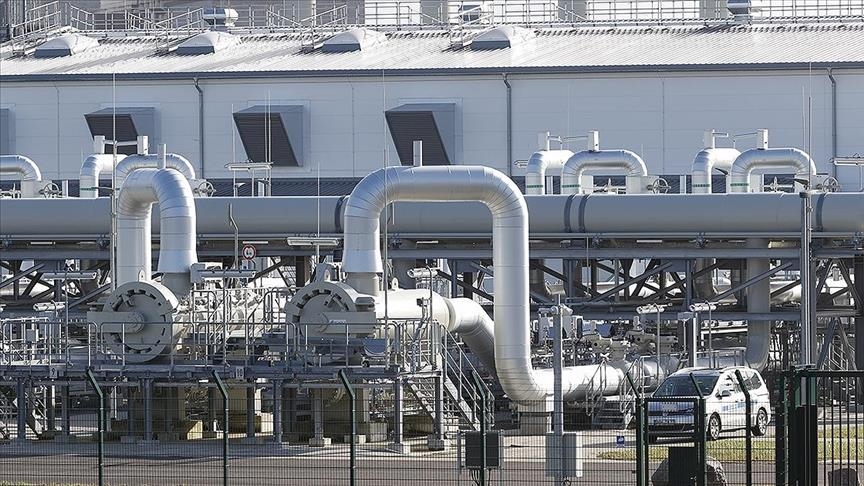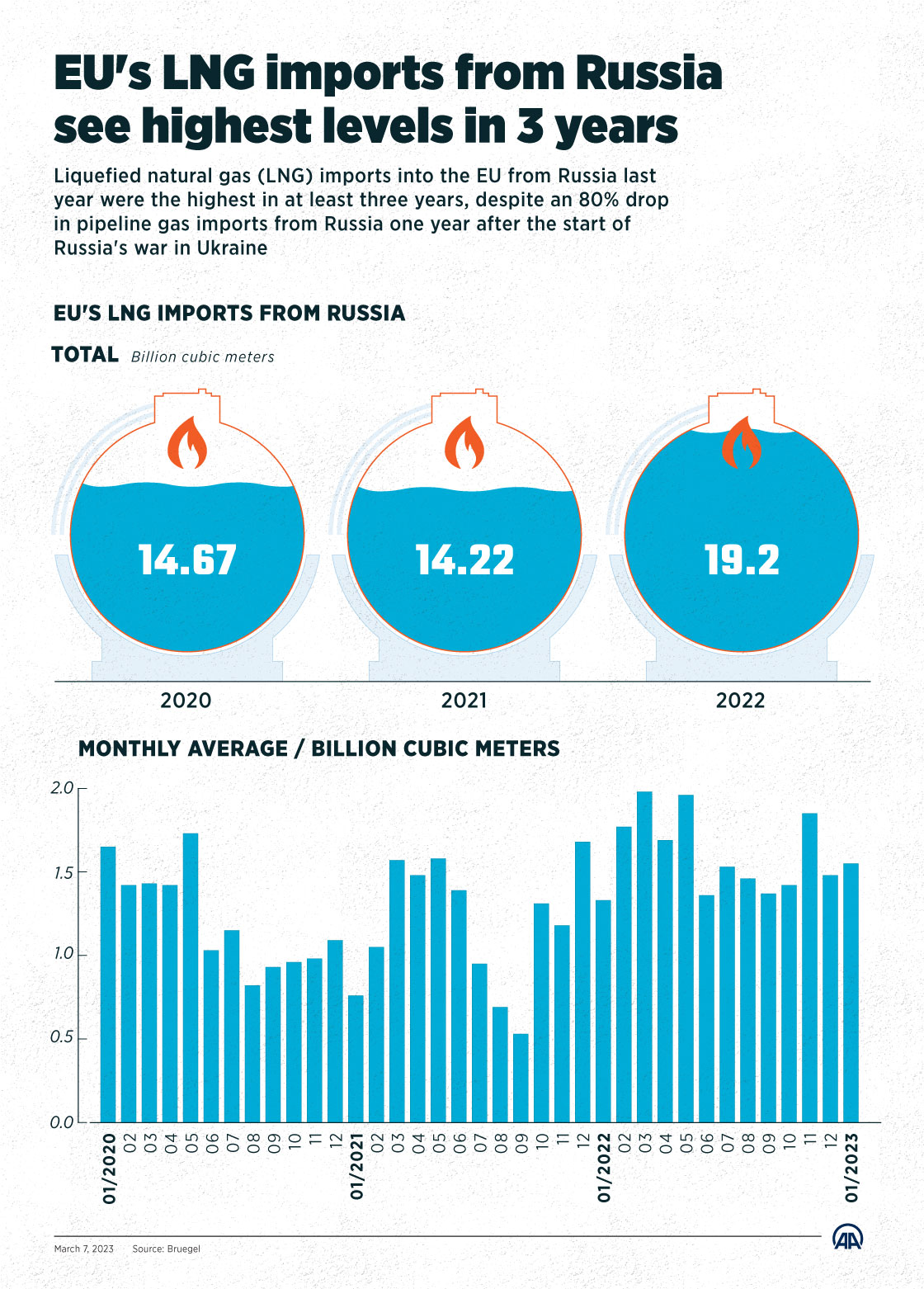EU's LNG imports from Russia see highest levels in 3 years
European Union's LNG imports from Russia last year rise by 31% and 35% compared to 2020 and 2021 volumes, respectively

LONDON
Liquefied natural gas (LNG) imports into the EU from Russia last year were the highest in at least three years, despite an 80% drop in pipeline gas imports from Russia one year after the start of Russia's war in Ukraine.
Since the start of Russia's war in Ukraine on Feb. 24, 2022, Western countries have responded with a wave of sanctions. The energy sanctions were designed to reduce Russia's revenue from fossil fuel exports.
The EU, which was heavily reliant on Russian fossil fuels, banned Russian coal imports in August 2022, followed by bans on seaborne crude oil in December 2022 and oil products in February 2023.
"In principle, sanctions are introduced in steps, and they have to be adjusted all the time. Otherwise, they do not work, not least because over time a country could find many ways of circumventing them," Julian Popov, a member of the European Council on Foreign Relations, told Anadolu.
"The EU has not imposed full sanctions on Russian gas, so about 8% of EU gas imports still come from Russia. Sanctions also have to be adjusted so that they do not do more harm to the sanctioning side than to the sanctioned one."
Russia earned an estimated €560 million per day from fossil fuel exports in the month up to the anniversary of the invasion of Ukraine, the Center for Research on Clean Energy and Air (CREA) calculated.
This is a reduction of 50% from a peak of €1.13 billion per day in March 2022. In February, Russia earned €280 million per day from crude oil, €120 million from oil products, €60 million from pipeline gas, €60 million from coal and €40 million from LNG.
EU still Russia's second-biggest client
The EU's daily fossil fuel imports from Russia remain at €100 million, with pipeline gas accounting for $30 million, crude oil accounting for $30 million, oil products accounting for $30 million, and LNG accounting for $10 million.
According to the CREA, the EU remains Russia's second-largest client after China due to continuous pipeline and LNG imports, as well as exceptions to import bans on crude oil and oil products.
The International Energy Agency (IEA) calculates that the EU's pipeline gas imports from Russia have dropped by 80% in the last year and Russia's share of the EU's gas demand is set to plunge from 40% to 10%.
"In the last 18 months, since the Russian energy war against Europe started, Europe has been adjusting to gas shortages and high prices. LNG flexibility and lowering LNG prices were priorities. Now Europe has clearly won the energy war with Russia. The EU reduced its gas consumption by 20% but its industrial output stayed unchanged," Popov noted.
EU's LNG imports from Russia in 2022 up 35% compared to 2021
Russian LNG exports to the EU currently face no sanctions or volume drops.
The EU's LNG imports from Russia reached 14.7 billion cubic meters in 2020, according to think-tank Bruegel, with May 2020 recording the highest monthly volume in imports at 1.74 billion cubic meters.
In 2021, the EU's Russian LNG imports stood at 14.2 billion cubic meters, registering 1.68 billion cubic meters on a monthly basis in December 2021.
In 2022, the EU's LNG imports from Russia reached a three-year high of 19.2 billion cubic meters, with monthly imports reaching 1.96 billion cubic meters in May 2022.
The bloc's LNG imports from Russia last year increased by 31% and 35% compared to 2020 and 2021 volumes, respectively.
Despite the fact that the EU's LNG imports from Russia remained strong following the war, the US held the largest share of total LNG imports, followed by Africa.
"It is very likely that Europe will find further opportunities to bring in alternatives that would secure sufficient liquidity in the EU gas market. Europe will also find ways to reduce its overall gas consumption thanks to more renewables, energy efficiency and demand response measures. Then further sanctions that would spread over the Russian LNG might be introduced," Popov said, adding that as LNG is a global commodity, sanctioning LNG shipments does not necessarily mean cutting Russia's gas revenue.
"If the sanctions cannot lead to a reduction of the Russian budget that feeds into the war effort, then the sanctions will be mostly symbolic. This is important but not a sufficient argument," he said.
"Energy crisis demonstrates importance of EU's neighbors in securing energy"
Apart from Lithuania, Michael Bradshaw, a global energy professor at Warwick Business School, believes that all other EU member states continue to import Russian LNG, either directly or indirectly.
"That is the point of difference between the EU and the UK. The UK put sanctions on Russian gas imports, particularly LNG. The UK does not take any imports of LNG from Russia, that is not true in Europe," he said.
The UK had announced an end to all imports of Russian LNG by Jan. 1 this year.
"The UK has never been physically dependent on Russian gas, but it is connected to the European gas market and therefore was exposed in the same way as the rest of Europe was. Over the last 12 months, the UK has been importing record levels of liquefied natural gas, a large amount of which has gone through its pipeline system to fill up storage in Europe," Bradshaw said.
He concluded that the European energy market is bigger than the EU, underscoring the importance of the UK, Norway and Türkiye in the EU's response to the energy crisis.
"I think this current crisis has demonstrated the importance of the EU's neighbors in securing energy," Bradshaw said, adding that the role of the TurkStream gas pipeline, Norway and the UK in providing a bridgehead to bring LNG to the EU aided countries in overcoming the energy crisis.
Anadolu Agency website contains only a portion of the news stories offered to subscribers in the AA News Broadcasting System (HAS), and in summarized form. Please contact us for subscription options.








